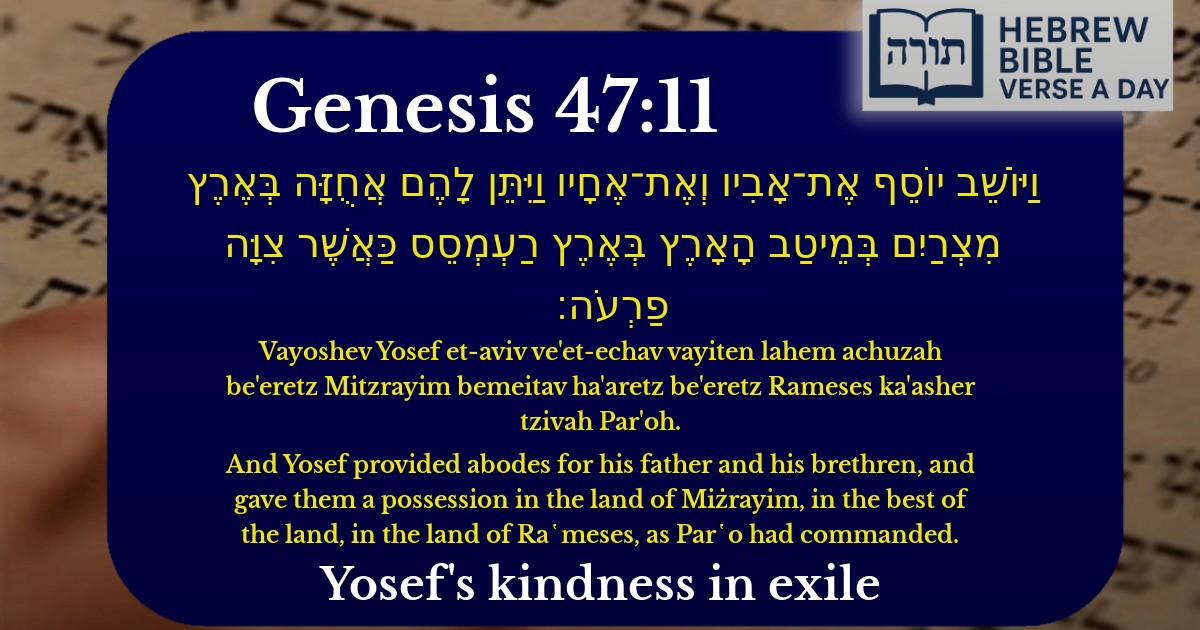Join Our Newsletter To Be Informed When New Videos Are Posted
Join the thousands of fellow Studends who rely on our videos to learn how to read the bible in Hebrew for free!
Hebrew Text
וַיּוֹשֵׁב יוֹסֵף אֶת־אָבִיו וְאֶת־אֶחָיו וַיִּתֵּן לָהֶם אֲחֻזָּה בְּאֶרֶץ מִצְרַיִם בְּמֵיטַב הָאָרֶץ בְּאֶרֶץ רַעְמְסֵס כַּאֲשֶׁר צִוָּה פַרְעֹה׃
English Translation
And Yosef provided abodes for his father and his brethren, and gave them a possession in the land of Miżrayim, in the best of the land, in the land of Ra῾meses, as Par῾o had commanded.
Transliteration
Vayoshev Yosef et-aviv ve'et-echav vayiten lahem achuzah be'eretz Mitzrayim bemeitav ha'aretz be'eretz Rameses ka'asher tzivah Par'oh.
Hebrew Leining Text
וַיּוֹשֵׁ֣ב יוֹסֵף֮ אֶת־אָבִ֣יו וְאֶת־אֶחָיו֒ וַיִּתֵּ֨ן לָהֶ֤ם אֲחֻזָּה֙ בְּאֶ֣רֶץ מִצְרַ֔יִם בְּמֵיטַ֥ב הָאָ֖רֶץ בְּאֶ֣רֶץ רַעְמְסֵ֑ס כַּאֲשֶׁ֖ר צִוָּ֥ה פַרְעֹֽה׃
וַיּוֹשֵׁ֣ב יוֹסֵף֮ אֶת־אָבִ֣יו וְאֶת־אֶחָיו֒ וַיִּתֵּ֨ן לָהֶ֤ם אֲחֻזָּה֙ בְּאֶ֣רֶץ מִצְרַ֔יִם בְּמֵיטַ֥ב הָאָ֖רֶץ בְּאֶ֣רֶץ רַעְמְסֵ֑ס כַּאֲשֶׁ֖ר צִוָּ֥ה פַרְעֹֽה׃
🎵 Listen to leining
Parasha Commentary
📚 Talmud Citations
This verse is not quoted in the Talmud.


Yosef's Settlement of Yaakov and His Brothers in Egypt
The verse (Bereshit 47:11) describes how Yosef settled his father Yaakov and his brothers in Egypt, granting them possession of the land of Ra'amses, the best part of Egypt, as Pharaoh had commanded. This act fulfilled Yosef's earlier promise to provide for his family during the famine (Bereshit 45:10-11).
Rashi's Explanation
Rashi comments that the phrase "וַיּוֹשֵׁב יוֹסֵף" ("And Yosef settled") implies that Yosef personally ensured his family's comfort and sustenance. He did not delegate this responsibility, demonstrating his deep care for his father and brothers. Rashi also notes that the land of Ra'amses was chosen because it was fertile and suitable for shepherding, the occupation of Yaakov's family.
The Significance of "Achuzah" (Possession)
The term "אֲחֻזָּה" (possession) is significant. Ramban explains that this was not merely temporary lodging but a hereditary holding, indicating that Pharaoh granted them permanent rights to the land. However, the Midrash (Tanchuma Vayigash 10) clarifies that this was not full ownership, as the Torah later states (Vayikra 25:23) that the land ultimately belongs to Hashem.
The Land of Ra'amses
The land of Ra'amses is identified as "מֵיטַב הָאָרֶץ" (the best of the land). Ibn Ezra explains that this region was particularly fertile, ideal for Yaakov's flocks. Sforno adds that settling them in the best land also honored Yaakov's stature as a revered figure in Egypt.
Pharaoh's Command
The verse concludes by noting that this settlement was "כַּאֲשֶׁר צִוָּה פַרְעֹה" (as Pharaoh had commanded). The Kli Yakar emphasizes that Yosef acted with Pharaoh's explicit permission, ensuring that his family's presence in Egypt was legally and politically secure. This foreshadows the eventual enslavement, as the Egyptians later resented the Israelites' privileged status (Shemot 1:8-10).
Lessons from the Verse